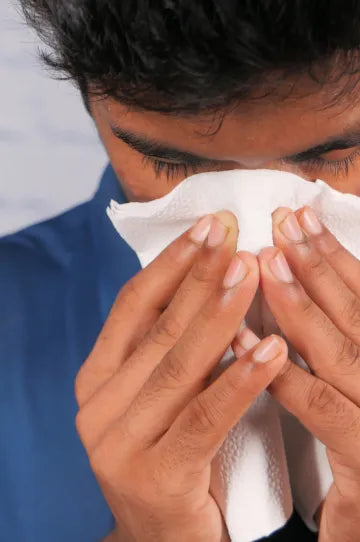




What are you looking for?

Discover Ayurvedic medicine for dry cough with Amiy Naturals. Herbal drops, Gut Reset & Stress Relief products soothe throat, improve digestion & boost immunity.
Dry cough (Vata-dominant kasa) is a persistent, irritating cough without mucus that can lead to throat soreness, chest discomfort, and sleepless nights. Ayurveda focuses on the root causes—dosha imbalance, dryness of the airways, weak Agni (digestion), and depleted Ojas (immunity). Using the best Ayurvedic medicine for dry cough soothes and lubricates the respiratory tract, reduces inflammation, supports digestion, and strengthens immunity. Unlike conventional suppressants that only numb the reflex, Ayurvedic remedies act internally to restore balance and provide long-term relief. In this blog, you’ll get complete information about herbs, diet, lifestyle, and supporting products to heal dry cough naturally.
Ayurveda links dry cough with aggravated Vata (dryness, roughness) and occasionally high Pitta (heat, burning). The lack of Kapha’s natural lubrication leaves the throat and bronchi dry and reactive. Poor digestion (Agni) and ama (toxins) further irritate the channels (srotas). True recovery comes from re-lubricating tissues, balancing doshas, kindling Agni, and rebuilding Ojas. Ayurvedic remedies target these root causes instead of masking symptoms. With regular use, they reduce throat irritation, calm the cough reflex, and restore comfortable breathing and sound sleep.

Dryness in the throat and bronchi triggers the cough reflex. Remedies featuring demulcent herbs like Yashtimadhu (Licorice) and honey coat mucous membranes, reducing irritation. Gentle lubrication calms tickling, eases soreness, and helps you rest. Regular soothing prevents micro-injury to tissues and supports faster recovery.
Weak Agni creates ama (toxins) that sensitize airways. Ayurvedic medicines stimulate digestion, improve assimilation, and reduce toxin load. When digestion is steady, systemic inflammation comes down, easing cough triggers. Daily support to Agni ensures cleaner channels and fewer flare-ups.
Excess Vata causes dryness and spasmodic coughing; Pitta adds burning and irritation. Remedies that pacify Vata (warm, unctuous, grounding) and, when needed, cool Pitta, restore comfort. Balanced doshas improve airway tone, circulation, and resilience. Over time, this leads to fewer bouts and a steadier respiratory rhythm.
Depleted Ojas and oxidative stress prolong cough. Herbs like Tulsi, Giloy, and Turmeric support liver detox, reduce inflammation, and strengthen host defenses. Better immunity means quicker resolution after infections and less lingering irritation. Long-term support also lowers the risk of recurrence.
Deeply demulcent and anti-inflammatory, Yashtimadhu coats and soothes dry, irritated mucosa. It reduces tickling, eases pain, and supports voice comfort. Regular intake helps restore moisture and resilience to the throat.

Tulsi’s antimicrobial and immunomodulatory actions help clear post-viral irritation. Its warming, sattvic nature calms Vata and supports easy breathing. Tulsi teas or extracts gently reduce reactivity in sensitive airways.
Pippali kindles Agni without aggravating Pitta when used correctly. It enhances bioavailability, supports lung circulation, and is valued in chronic, weakness-associated cough. Over time it helps rebuild respiratory strength.
Traditionally used for cough and bronchial irritation, Vasa soothes the bronchi and eases spasmodic cough. It supports smoother airflow and reduces the urge to cough.
Ginger warms, improves digestion, and disperses ama that fuels airway sensitivity. Its anti-inflammatory action reduces throat pain and supports faster recovery—especially helpful with honey and warm water.
While many syrups suppress the cough reflex for temporary comfort, Ayurvedic remedies work on root causes: they soothe dryness, balance doshas, kindle digestion, and strengthen immunity. This holistic approach helps prevent relapse and nighttime flare-ups. Carefully combined herbs act synergistically, offering lasting relief without sedative side effects. Formulations are natural and suitable for longer-term use when guided appropriately.
Favor soups, stews, soft-cooked grains, and ghee to pacify Vata. Avoid cold, dry, or fried foods and excessive spices. A steady, warm diet supports tissue lubrication and calm airways.
Sip warm water and herbal teas through the day. Steam inhalation (with Tulsi/eucalyptus) moistens passages and eases tickling. Adequate fluids maintain mucosal elasticity.
Pranayama (e.g., Anulom-Vilom) improves lung capacity and reduces reactivity. Light yoga boosts circulation and lymphatic flow, aiding recovery. Avoid overexertion during active irritation.
Stress aggravates Vata and Pitta, worsening dryness and inflammation. Prioritize sleep, meditation, and deep breathing. Remedies work best alongside consistent rest and calm routines.
While we do not offer a specific cough syrup, select Amiy Naturals oral drops complement Ayurvedic care for dry cough:
Regular use of these products alongside Ayurvedic diet and lifestyle supports natural, sustained relief from dry cough.
1. Which is the best Ayurvedic medicine for dry cough?
Demulcent and Vata-pacifying remedies with Yashtimadhu, Tulsi, Pippali, Vasa, and Ginger are highly effective for soothing dry, irritating coughs.
2. Can Ayurvedic medicine help post-viral or allergy-related dry cough?
Yes. By reducing airway dryness and inflammation, improving digestion, and strengthening immunity, Ayurveda helps resolve lingering cough naturally.
3. How long to see results with Ayurvedic remedies?
Many feel relief within 3–5 days; deeper balance typically builds over 2–3 weeks with consistent use, diet, and rest.
4. Is Ayurveda safe for long-term cough care?
Yes. Herbal formulations are generally safe for daily, longer-term use when used appropriately, supporting lasting respiratory health.
5. Can Ayurveda prevent recurrence of dry cough?
Absolutely. By balancing doshas, kindling Agni, and rebuilding Ojas—plus lifestyle and stress management—Ayurveda reduces the chance of future flare-ups.
You can also search for: Ayurvedic Medicine For Acidity And Gas | Ayurvedic Medicine For Acidity Safe Gas Relief | Ayurvedic Medicine For Allergy Relief Simple Steps | Ayurvedic Medicine For Anxiety And Stress Calm The Mind Sleep Better | Ayurvedic Medicine For Cholesterol Natural Control Guide | Ayurvedic Medicine For Constipation | Ayurvedic Medicine For Constipation Simple Relief | Ayurvedic Medicine For Headache Gentle Lasting Relief | Ayurvedic Medicine For Hormonal Imbalance Women S Guide | Ayurvedic Medicine For Hormonal Imbalance Women S Guide 1 | Ayurvedic Medicine For Inflammation And Pain Natural Relief | Ayurvedic Medicine For Irregular Periods Gentle Relief Balance | Ayurvedic Medicine For Joint Muscle Pain Simple Relief | Ayurvedic Medicine For Knee Pain Natural Relief Guide | Ayurvedic Medicine For Nerve Pain Natural Relief Guide | Ayurvedic Medicine For Pimples Clear Skin Naturally | Ayurvedic Medicine For Sleep Gentle Ways To Rest | Ayurvedic Medicine For Stomach Pain Gentle Relief | Ayurvedic Medicine For Weight Gain Safe Natural Ways | Ayurvedic Medicine Joint Muscle Pain | Ayurvedic Medicine Simple Guide To Natural Healing | Ayurvedic Solution For Stress Anxiety Amiy Naturals | Ayurvedic Syrup For Irregular Periods Gentle Cycle Support | Best Ayurvedic Health Supplements Amiy Naturals Online | Best Ayurvedic Medicine For Acidity And Gas | Best Ayurvedic Medicine For Blood Circulation Amiy Muscle Mercy 1 | Best Ayurvedic Medicine For Body Pain And Weakness Natural Relief | Best Ayurvedic Medicine For Gastric Problem Simple Relief | Best Ayurvedic Medicine For Insomnia Anxiety Amiy Naturals | Best Ayurvedic Medicine For Insomnia Anxiety Amiy Naturals 1 | Best Ayurvedic Medicine For Insomnia Sleep Drops By Amiy | Best Ayurvedic Medicine For Memory And Concentration | Best Ayurvedic Medicine For Migraine Gentle Relief | Best Ayurvedic Medicine For Neurological | Best Ayurvedic Medicine For Painful Menstruation Amiy Naturals | Best Ayurvedic Medicine For Sinus Allergy Relief | Best Ayurvedic Medicine For Skin Diseases Amiy Naturals | Best Ayurvedic Medicine For Snoring Problems Natural Relief | Best Ayurvedic Medicine For Stamina Energy | Best Ayurvedic Medicine For Stomach Cleansing Drops | Best Ayurvedic Medicine For Stomach Problems | Best Ayurvedic Medicine For Varicose Veins Relief | Best Ayurvedic Medicine For Women S Health Amiy Naturals Drops | Best Ayurvedic Medicine For Women S Health Amiy Naturals Drops 1 | Best Ayurvedic Oil For Muscle Pain Relief Safe Natural Support | Best Ayurvedic Products For Skin Herbal Medicine Onlin 1 | Best Ayurvedic Skin Care Products Clear Calm Glowing | Best Ayurvedic Skin Care Products Simple Picks For Clear Calm Skin | Best Ayurvedic Syrup For Glowing Clear Skin Amiy Naturals | Best Medicine For Nerve Pain In Neck Ayurvedic Guide | Buy Ashwagandha Ayurveda Drops Stress Relief Energy Boost | Buy Ayurvedic Blood Purifier Natural Herbal Drops For Healthy Blood | Buy Best Ayurvedic Medicine For Memory Concentration Amiy Naturals | Buy Best Ayurvedic Tonic For Glowing Skin Amiy Naturals | Top 10 Ayurvedic Herbs For Daily Use | Weight Loss Ayurvedic Medicine Safe Options For Women
